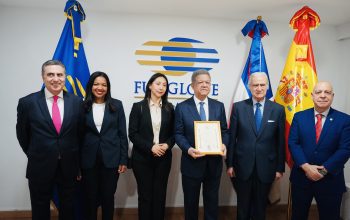news
GFDD and FUNGLODE Participate in UN ECOSOC Forum
April 8, 2008
On April 4, 2008, Pilar Sandóval, Executive Director of the United Nations Association of the Dominican Republic (UNA-DR), represented Global Foundation for Democracy and Development (GFDD) and Fundación Global Democracia y Desarrollo (FUNGLODE) in the United Nations Economic and Social Council (ECOSOC) NGO Forum,
“The Role of Civil Society in Promoting Sustainable Development and the New International Aid Architecture,” which took place at UN Headquarters in New York City.
“The Role of Civil Society in Promoting Sustainable Development and the New International Aid Architecture,” which took place at UN Headquarters in New York City.
During the conference, which provided selected NGOs the opportunity to share proven practices for sustainable development, Sandóval discussed the foundations’ Coral Garden Project and provided examples of how the initiative is contributing to sustainable development in the Dominican Republic, particularly in the areas of environmental protection, community development, tourism and disaster prevention.
 The Dominican Republic Coral Garden
The Dominican Republic Coral GardenProject is a dynamic public-private initiative to conserve and restore threatened Caribbean coral reefs and marine protected marine habitats in the Marine Protected Areas (MPAs) of Punta Cana, Bayahibe, Samana and Sosua Bay. The Project is being implemented by GFDD, FUNGLODE and Counterpart International, in association with a series of national stakeholders, non-governmental organizations, divers’ and fishermen’s associations, as well as representatives from the
ministries of environment and natural resources and tourism.
The initiative seeks to: reduce negative impacts from land-based pollution, mass tourism and dive-related tourism, over-fishing and sedimentation on coral reefs in marine protected areas, via public-private education, and technical assistance and training from various sectors; re-establish healthy, reproductive populations of acropora cervicornis within
marine protected zones; build capacity for coral reef restoration among marine park area managers, fishing communities and the dive tourism industry, through training of trainers in topics such as: coral reef fishery ecology, destructive reef usage/ over-fishing issues, management and stewardship of marine resources; and build a network of MPA practitioners throughout the Dominican Republic trained and involved in hands-on, low-tech restoration and the monitoring of such activities. The
initiative does so through: reconnaissance and mapping of coral populations and collection of samples from sites; the establishment of restoration training sites and coral grow-out farms within sheltered lagoonal waters; the cultivation of corals via successful and proven methods; the establishment of cross-site transplanting demonstrations; monitoring of demonstration and collection sites; and the organization of national training workshops for MPA managers, conservation organizations and
researchers.
marine protected zones; build capacity for coral reef restoration among marine park area managers, fishing communities and the dive tourism industry, through training of trainers in topics such as: coral reef fishery ecology, destructive reef usage/ over-fishing issues, management and stewardship of marine resources; and build a network of MPA practitioners throughout the Dominican Republic trained and involved in hands-on, low-tech restoration and the monitoring of such activities. The
initiative does so through: reconnaissance and mapping of coral populations and collection of samples from sites; the establishment of restoration training sites and coral grow-out farms within sheltered lagoonal waters; the cultivation of corals via successful and proven methods; the establishment of cross-site transplanting demonstrations; monitoring of demonstration and collection sites; and the organization of national training workshops for MPA managers, conservation organizations and
researchers.
In addition to being an initiative focused on environmental preservation, the Project provides the opportunity to realize work in the area of community development. It works with hotels, schools, local fishing and diving associations and other institutions to raise awareness of the impacts of climate change and the need for environmental management. It largely impacts children and youth, instilling in them the importance
of protecting marine environments.
of protecting marine environments.
As part of the program, community actors work collaboratively to devise territorial boundaries and plans for the management of MPAs. Such plans have been implemented in Sosua and have succeeded in r






